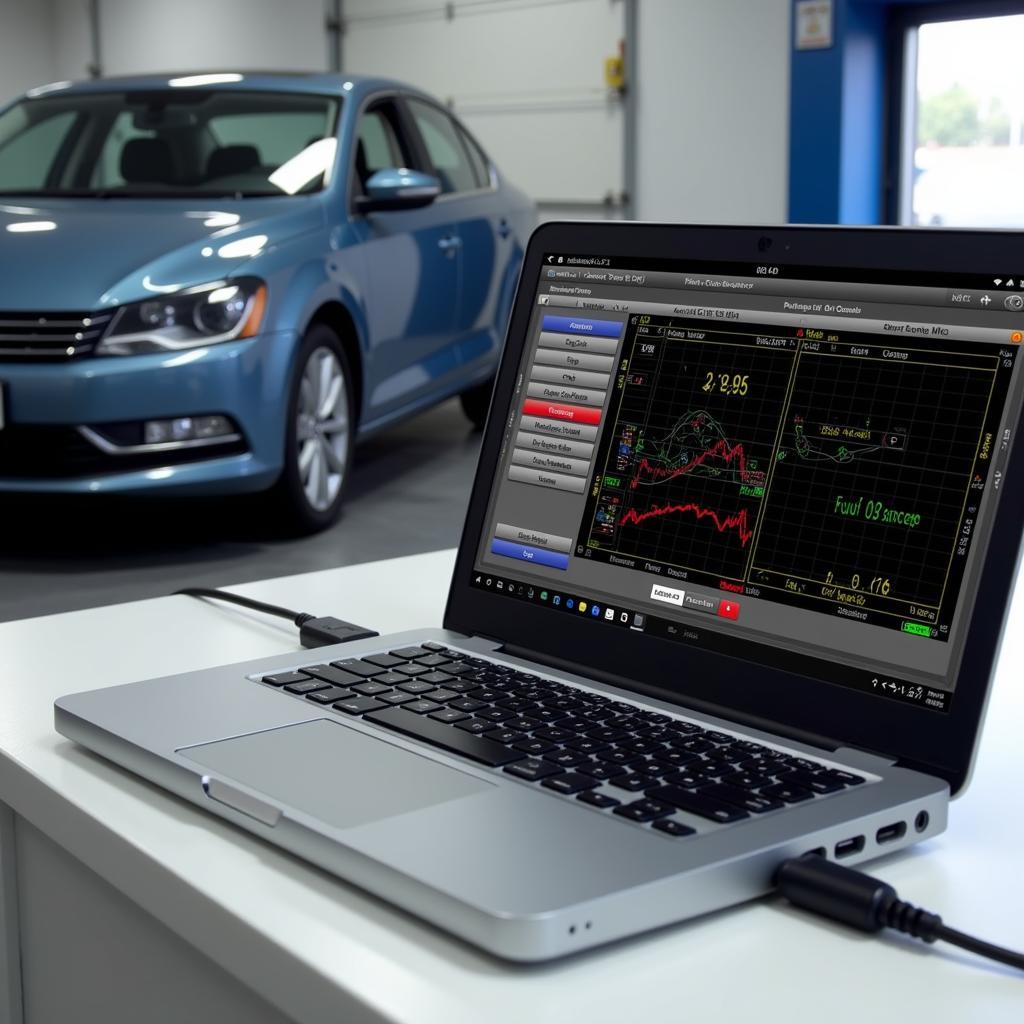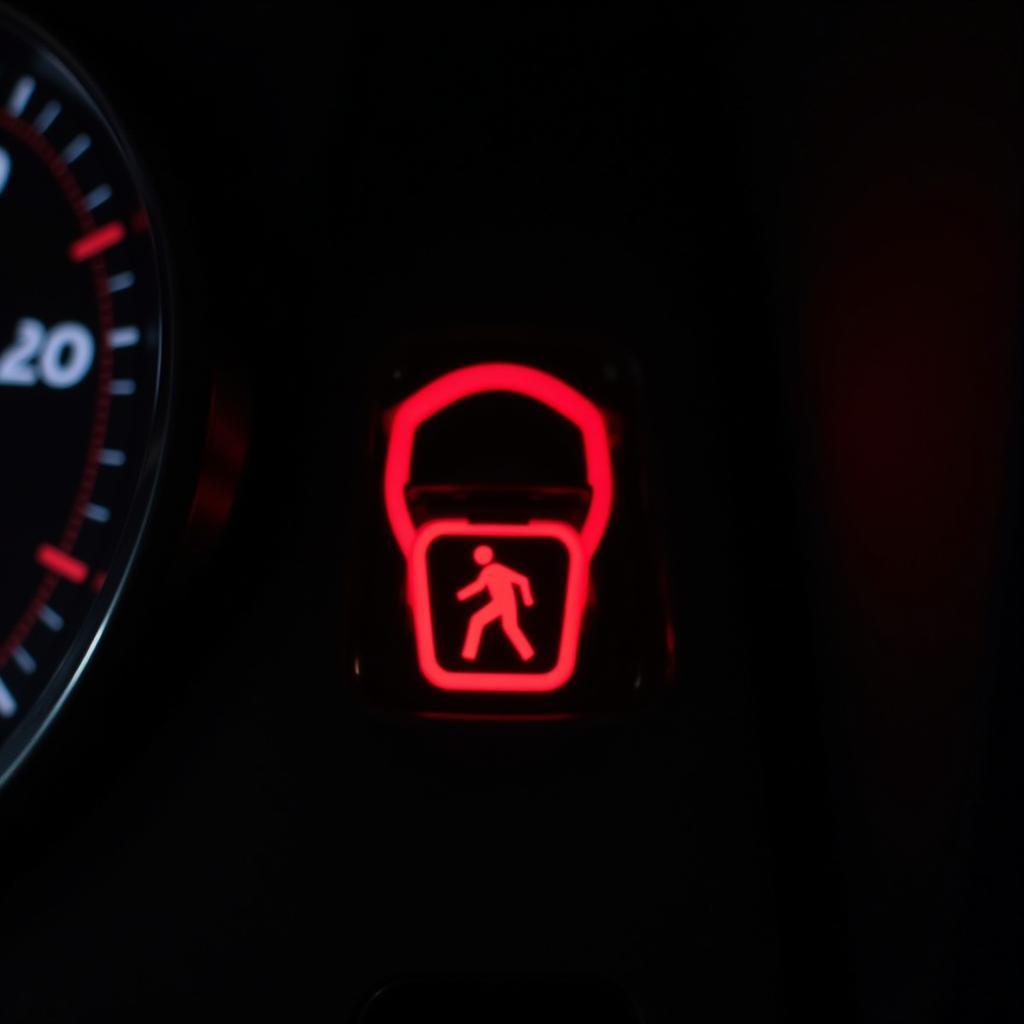The brake fluid warning light on your VW Passat is a crucial safety feature that shouldn’t be ignored. It usually illuminates when there’s an issue with the braking system, often related to low brake fluid levels.
This comprehensive guide will help you understand the common causes of a brake fluid warning light in a VW Passat, how to diagnose the problem, and potential solutions.
Common Causes of a Brake Fluid Warning Light on a VW Passat
Several factors can trigger the brake fluid warning light on your VW Passat. Here are some of the most common culprits:
- Low Brake Fluid Level: This is the most frequent cause. As your brake pads wear down, the brake fluid level in the reservoir naturally drops. If it falls below a certain point, the warning light will activate.
- Brake Fluid Leak: A leak in your brake lines, calipers, or wheel cylinders can lead to a rapid loss of brake fluid, triggering the warning light.
- Worn Brake Pads: As mentioned earlier, worn brake pads indirectly cause the brake fluid level to drop. If you haven’t replaced your brake pads in a while, this could be the reason behind the warning light.
- Faulty Brake Fluid Level Sensor: While less common, a malfunctioning brake fluid level sensor can provide inaccurate readings, leading to a false warning light.
Diagnosing the Issue: What to Do When Your Brake Fluid Warning Light Turns On
If your brake fluid warning light comes on, it’s essential to take immediate action. Follow these steps to diagnose the issue:
- Safely Park Your Car: Find a safe location to pull over as soon as possible. Driving with a potential brake issue is extremely dangerous.
- Check the Brake Fluid Level: Carefully open the hood and locate the brake fluid reservoir. Most VW Passats have a translucent reservoir with “Min” and “Max” markings. Check the fluid level and note its color.
- Inspect for Leaks: If the fluid level is low, inspect the area around the reservoir, brake lines, and the wheels for any signs of leakage. Look for wet spots or drips of brake fluid, which is typically clear or amber in color and has an oily texture.
Potential Solutions and When to Seek Professional Help
Depending on your diagnosis, here are some potential solutions:
- Adding Brake Fluid: If the brake fluid level is low but there are no leaks, you can carefully top it off with the correct DOT specification brake fluid (refer to your owner’s manual).
- Replacing Worn Brake Pads: If your brake pads are worn, it’s time to replace them. This will also involve adding new brake fluid.
- Professional Repair: For brake fluid leaks or a suspected faulty sensor, it’s crucial to seek professional help. These repairs require specialized knowledge and tools to ensure your safety.
Remote Diagnostics and Software Solutions
In some cases, the brake fluid warning light may be related to a software glitch or an issue with the car’s electronic control unit (ECU). Modern vehicles, including VW Passats, heavily rely on software to manage various systems, including braking.
This is where remote diagnostics and software solutions come into play. By connecting your car to a specialized diagnostic tool remotely, expert technicians can:
- Read Fault Codes: Retrieve diagnostic trouble codes (DTCs) stored in your car’s ECU, which can pinpoint the root cause of the warning light.
- Analyze Sensor Data: Examine live data from various sensors, including the brake fluid level sensor, to identify any discrepancies or malfunctions.
- Perform Software Updates or Reprogramming: In some cases, a software update or reprogramming of the ECU might be necessary to resolve the issue.
 VW Passat Remote Diagnostics
VW Passat Remote Diagnostics
Expert Insights on VW Passat Brake Fluid Warning Light Issues
“Many drivers underestimate the importance of addressing brake fluid-related issues promptly,” says Mark Stevenson, a senior automotive technician specializing in VW vehicles. “Ignoring the warning light can lead to significantly more expensive repairs down the line and, more importantly, compromise your safety.”
“Remote diagnostics have revolutionized the way we diagnose and address these problems,” adds Stevenson. “It allows us to quickly pinpoint the issue, often before it escalates, saving car owners time and money.”
Preventing Future Brake Fluid Warning Light Issues in Your VW Passat
Here are some preventative measures to reduce the likelihood of encountering brake fluid warning light problems:
- Regular Brake Fluid Flushes: VW recommends flushing your brake fluid every 2 years or as specified in your owner’s manual. This helps maintain optimal brake fluid condition and prevents corrosion in the system.
- Timely Brake Pad Replacements: Don’t wait for your brake pads to wear down completely. Replace them according to the manufacturer’s recommendations or sooner if you notice any signs of wear.
- Regular Vehicle Inspections: Routine inspections by a qualified mechanic can help identify potential brake system issues early on.
Conclusion: Addressing Brake Fluid Warning Lights Promptly is Crucial
The brake fluid warning light in your VW Passat should never be disregarded. By understanding its potential causes and following the diagnostic steps outlined, you can take appropriate action to ensure your safety and prevent further damage to your vehicle. Remember, professional help is often necessary, and remote diagnostics can provide quick and efficient solutions for software-related issues.
By prioritizing brake system maintenance and seeking timely repairs, you can enjoy a safer and more reliable driving experience in your VW Passat.
FAQs:
1. Can I drive my VW Passat with the brake fluid warning light on?
It’s highly dangerous to drive with the brake fluid warning light on. Pull over safely as soon as possible and diagnose the issue.
2. How often should I check my VW Passat’s brake fluid level?
It’s a good practice to check your brake fluid level at least once a month and before any long trips.
3. What type of brake fluid does my VW Passat use?
Refer to your owner’s manual for the correct DOT specification brake fluid. Using the wrong type can damage your braking system.
4. Can a faulty brake fluid level sensor cause the warning light to come on even if the fluid level is okay?
Yes, a malfunctioning sensor can provide inaccurate readings, leading to a false warning.
5. How much does it cost to fix a brake fluid leak in a VW Passat?
The cost can vary significantly depending on the location and severity of the leak. It’s best to get a quote from a qualified mechanic.

